AMD Confirms Zen 5 CPUs and Gaming Decline
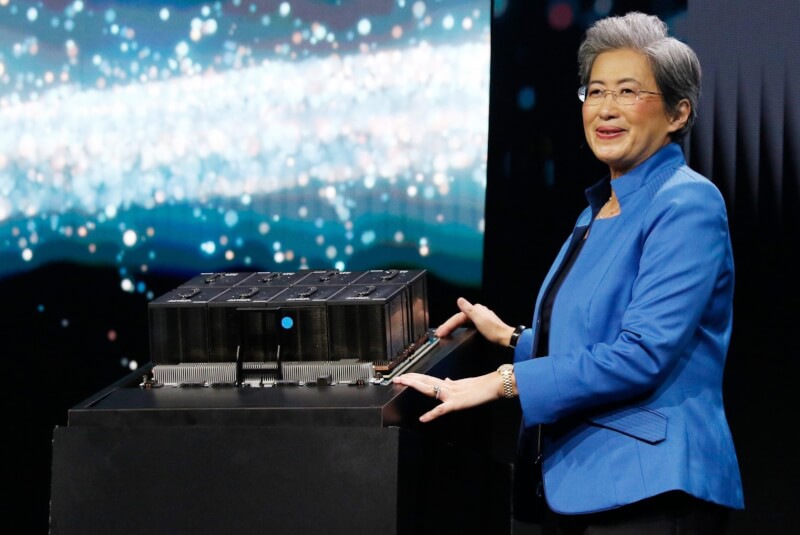
AMD released its Q1 2024 earnings yesterday, highlighting strong sales in the data center segment. During the earnings call, AMD's CEO, Lisa Su, gave a brief report on where the company is currently and where it is going.
This year will be all about Zen 5 as it enters both the client and data center segments. It looks like AMD is betting everything on data centers in 2024 by accelerating their EPYC CPU and Instinct GPU roadmaps. On the CPU side, the AMD Zen 5 core architecture will play a major role, which will power two major product families, EPYC "Turin" and Ryzen "Strix". These two chips are said to be sampling to partners now, with the launch expected sometime in the second half of the year.
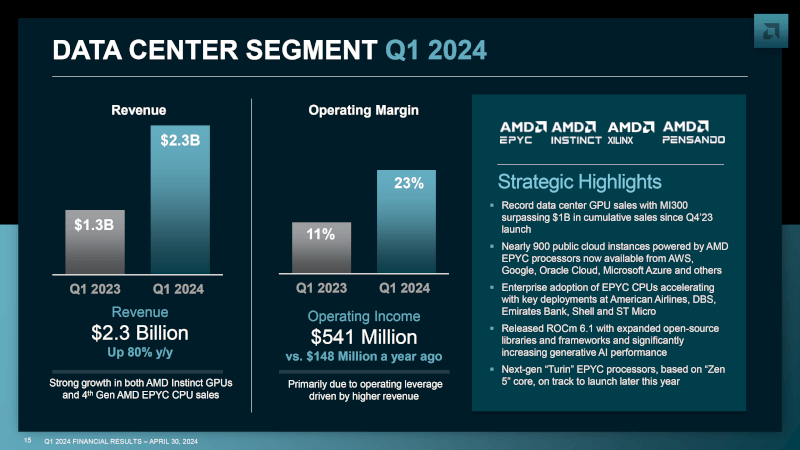
"Our priorities for 2024 are very clear: accelerate our growth in the data center segment by increasing production of Instinct GPUs and gaining market share with our EPYC processors. Launch our next-generation Zen 5 PC and server processors that extend our leading performance and expands our adaptive computing portfolio with differentiated solutions," Lisa Su said of the new plans.
First with the AMD EPYC Turin CPUs, the family will be the first EPYC line to feature the brand new Zen 5 cores. These CPUs are being widely distributed to customers and partners, and the silicon is reported to look fantastic.
Lisa Su mentions that the EPYC Turin CPUs provide significant advances in performance and efficiency, which will help drive their market share in the server segment even further. AMD's partners are already developing more than 30% of the platforms powered by the 5th generation EPYC "Turin" CPUs, which will be introduced later this year.
According to a recent guidance from AMD, EPYC Turin CPUs will offer drop-in upgrade with existing 4th generation EPYC servers on the SP5 & SP6 platforms. We expect to see up to 128 Zen 5 and 192 Zen 5C core offerings in the family.
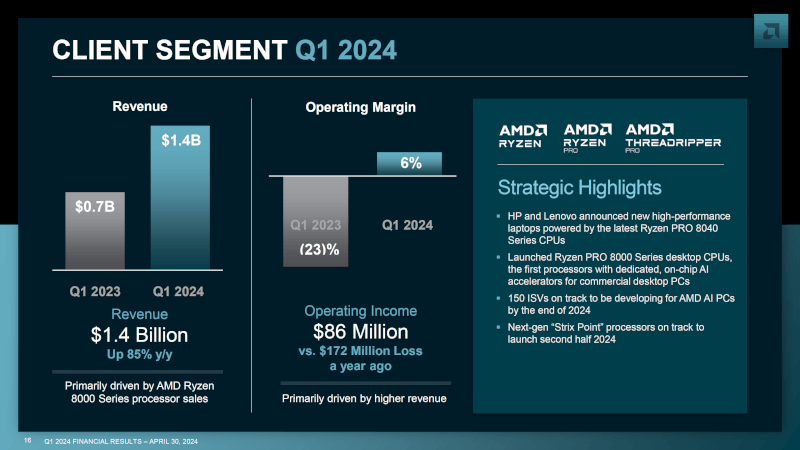
Looking at the Client side, AMD is positioning its Ryzen Strix APUs as the "next big step" in the company's AI PC roadmap. AMD's Strix APUs will be a very important product for the company in its client offering, targeting the premium market segment with a mix of next generation core IPs including Zen 5 CPU, RDNA 3+ GPU and XDNA 2 NPU core , all packed under one roof. The Strix APUs will be launched in the second half of this year.
Based on what we know, AMD's Ryzen Strix APUs will come in two flavors, a high-performance chiplet and a standard monolithic die. The former will be aimed at the enthusiast segment, while the latter will be designed for thin and light platforms while offering significant performance improvements. The NPU performance is already expected to be 3x faster than the existing Ryzen Hawk "8040" APUs. AMD also expects to launch more mainstream product families as we move into 2025, such as Ryzen Kraken APUs.
Lisa Su further elaborated , "We will also take the next big step in our AI PC roadmap later this year with the launch of our next-generation Ryzen mobile processors, codenamed Strix. Customer interest in Strix is very high based on the significant performance and energy efficiency improvements we deliver. Design momentum for premium notebooks exceeds previous generations as Strix enables next-generation AI experiences in laptops that are thinner, lighter and faster than ever before."
When we look at the Strix products within the AI PC products, they are really suitable for the premium segment of the market. And I think that's where you're going to see some of the strongest content in AI PC at the beginning. And then as we go into 2025, you'll see it spread more broadly across the rest of the portfolio.
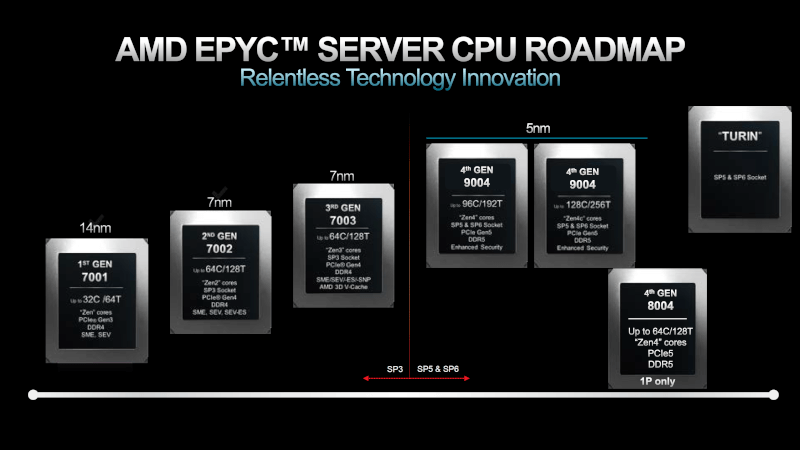
In terms of sales and revenue, the data center took the lead, reporting strong growth on both the EPYC CPU and Instinct GPU fronts. While AMD's EPYC CPUs accounted for the majority of the shares, the Instinct MI300 series became the fastest growing product in AMD's history, with sales exceeding $1 billion in less than two quarters. AMD reports that several partners are developing servers with the new MI300 accelerators, and they expect even better growth in the coming quarters.
AMD also highlights that they are seeing market share on the server CPU side, which will help them. AMD currently has a server market share of between 25-30%, which will expand further with EPYC+Instinct combo servers and the launch of future variants such as Turin later this year.
We have reported on the updated variants of the Instinct MI300 series and these were hinted at again during the earnings call. Lisa Su said that they have both successors to the MI300 as well as the next generation "MI400" in development. The chiplet and CoWoS package technologies make the Instinct a flexible product, and with reports that Samsung has struck a $3 billion deal with AMD for its HBM3E technology, it looks like we'll soon see the announcement of the MI350 and MI370 accelerators for the AI segment with an expected launch between the end of this year and the beginning of next year.
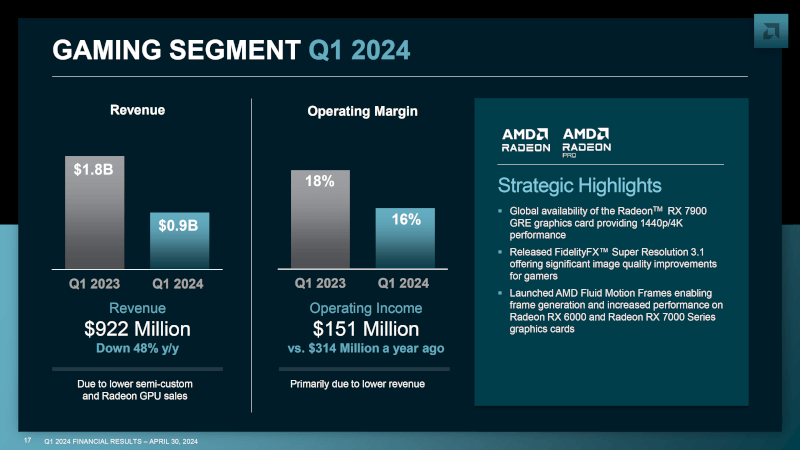
Finally, AMD sheds some light on the gaming side of things. The segment saw the biggest decline and it doesn't look like things will improve much in the coming quarter either. It is indicated that the second half of the year will be even lower than the first half and that Q2 will also be very low. AMD launched some new Radeon GPUs in the first half of 2024, primarily the Radeon 7600 XT and Radeon RX 7900 GRE for global markets, but the reception has not been that strong. Neither console side "Semi-Custom" is very large.
Latest processor - cpu
-
31 Octprocessor - cpu
-
16 Sepprocessor - cpu
AMD Ryzen AI 7 PRO 360 spotted
-
04 Sepprocessor - cpu
Intel scores big AI chip customer
-
04 Sepprocessor - cpu
Exclusively-Intel manufacturing store drawers
-
29 Augprocessor - cpu
Big performance boost for Ryzen CPUs
-
28 Augprocessor - cpu
Intel shares could fall in battle with TSMC and NV
-
28 Augprocessor - cpu
AMD is claimed to have been hacked
-
27 Augprocessor - cpu
Intel presents Lunar Lake, Xeon 6, Guadi 3 chips
Most read processor - cpu
Latest processor - cpu
-
31 Octprocessor - cpu
AMD will launch the Ryzen 7 9800X3D on November 7
-
16 Sepprocessor - cpu
AMD Ryzen AI 7 PRO 360 spotted
-
04 Sepprocessor - cpu
Intel scores big AI chip customer
-
04 Sepprocessor - cpu
Exclusively-Intel manufacturing store drawers
-
29 Augprocessor - cpu
Big performance boost for Ryzen CPUs
-
28 Augprocessor - cpu
Intel shares could fall in battle with TSMC and NV
-
28 Augprocessor - cpu
AMD is claimed to have been hacked
-
27 Augprocessor - cpu
Intel presents Lunar Lake, Xeon 6, Guadi 3 chips






